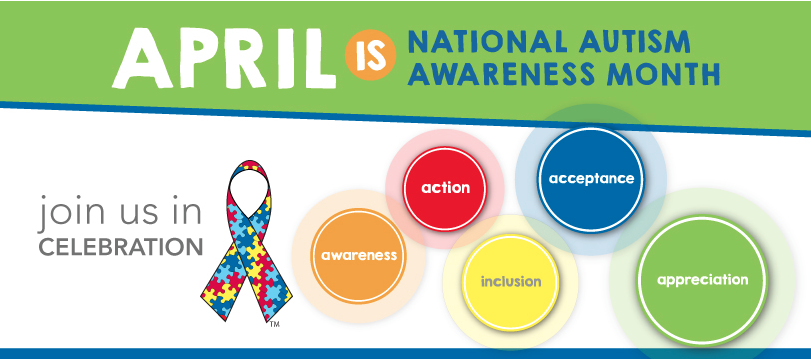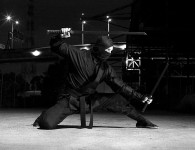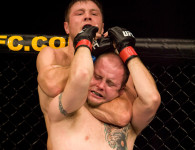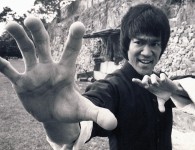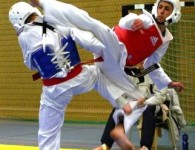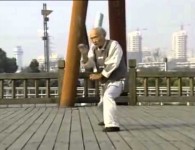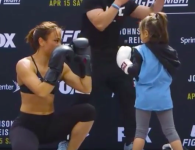April is Autism Awareness Month, or Autism Acceptance Month, if you prefer. As part of the Autism Society’s decades-long campaign to support people who have what is now most commonly referred to as Autism Spectrum Disorder, it was created to “promote awareness, inclusion and self-determination for all, and assure each person with ASD is provided the opportunity to achieve the highest possible quality of life” and is now working toward “ensuring acceptance and inclusion in schools and communities that results in true appreciation of the unique aspects of all people.”
So what does this have to do with a martial arts blog? Well, it turns out that martial arts training can be beneficial to many people on the spectrum, who can face difficulties with physical and social skills. Good martial arts instruction can appeal to autistics students’ tendencies toward focus and routine, and help them work on their physical and social skills, in a safe and encouraging environment. It can help them develop self-defense skills that, sadly, are often necessary for a population who are more likely to be bullied. The skills themselves also have overall health benefits. A 2012 study found that kata techniques could help autistic children with repetitive movement issues. E. Paul Zehr, PhD, a professor and martial artist, elaborated on that idea and discussed his own experience as someone who has worked with autistic children in an article for Psychology Today that same year.
Some organizations are even designing specific martial arts training with autistic kids in mind. Canada’s Child Development Institute offers the Integra Mindfulness Martial Arts and Integra Young Warriors programs, which are designed to help children and young adults with various learning disabilities, some of whom have autism. (This blogger, who is also on the spectrum, volunteered with those classes in 2009 and 2010 and can attest to their awesomeness.) The international organization Fighting For Autism offers therapeutic kickboxing lessons for kids with ASD.
Martial arts doesn’t just help autistic people, either. Some autistic athletes genuinely thrive in their chosen discipline(s). Being on the spectrum might present unique challenges in terms of coordination and sensory perception, among other things, but it can also a person qualities that will help their martial arts training, like intense focus, and a willingness to learn technique through careful repetition.
To celebrate, Autism Awareness Month, we’d like to bring some more awareness to some of these amazing individuals on the spectrum who are kicking butt in wrestling, kickboxing, and MMA.
Chloe Spiteri
Spiteri was diagnosed with epilepsy, neurological problems, and autism symptoms when she was 3 years old. “I was written off by many professionals and told I need to be on heavy medication and in full time boarding school,” she writes in a recent post on Fighting For Autism’s Facebook page. Neither Chloe nor her parents were ready to give up, though, and with the right supports she was able to prove those experts wrong. Her epilepsy stopped when she was 11, and her symptoms have become less severe, although she still deals with some communication and routine-related issues.
In school, she was introduced to amateur wrestling, and quickly became one of Great Britain’s top prospects in the sport. She’s now a five time National Champion and a member of Team GB. When she’s not competing and training, she also works with disabled children and as Fight For Autism Fighter Ambassador. “I am not ashamed to be who I am and want to go out there and share my story to others and let them know nothing is impossible, as well as provide support and advice,” she says in her Fighting For Autism statement. “Through self belief, being persistent, and understanding and accepting myself, I have been able to defeat any barriers that come my way and to get where I am.”
Check out Spiteri in action at the 2014 Commonwealth Games:
Jo Redman
Martial Arts Illustrated Hall of Famer and multiple time world and national kickboxing champion Jo Redman was already an accomplished martial artist when she was finally diagnosed with Asperger’s Syndrome in early adulthood and ADHD at 28. Her father initially took her to a kickboxing club to help the seemingly shy Redman develop her self confidence when she was 13. While she says that it took a few years for her to open up to anyone at the club, she embraced the training itself immediately. “I loved it straight away and set myself goals to achieve my black belt, fight for England and be the best in the world – aimed high. There was no looking back once I started,” she said in an interview with me for Fightland in 2014.
She still hasn’t looked back. In addition to achieving all of her goals, she has become a patron of Anna Kennedy Online and an ambassador for Fighting For Autism. She’s also a popular public speaker, who gives motivational talks on her life with autism and her successes.
“I don’t believe that I would be a world champion in my sport if I didn’t have Asperger’s, and that’s simply because of the traits I have,” she said in a 2014 video for In Good Company UK. She expanded on that idea for Fightland, saying “The repetition, perfectionism and focus Asperger’s gives combined with the need to be on the go constantly that comes with ADHD which helps with my reactions and I do feel I judge and react to things quicker. To be honest with my fighting it just feels natural. I don’t understand why everyone doesn’t achieve what I do, I just go and do it.”
Here’s Redman in action at the Freestyle Kickboxing Nationals in 2013:
Serena DeJesus
Inspired by a childhood love of cartoons like Sailor Moon and Power Rangers and video games like Street Fighter (“I always wanted to learn how to kick butt and save the day just like my heroes on the screen,” she told Collateral Damage MMA last year) and an adolescent fondness for old UFC events, Serena DeJesus took up Brazilian Jiu-Jitsu when she was 18.
Six years later, the Muay Thai and MMA fighter is currently preparing for her next amateur match on Tuff-N-Uff’s April 29 card. She’s also keeping busy as a Fighting for Autism ambassador and has a part in the upcoming film Fight Valley with Miesha Tate, Holly Holm, and Cris Cyborg.
“[MMA] allows me to pour out all my frustrations and other emotions from me being over-stimulated that have piled up in the course of the day. Whenever I haven’t trained for a few days, I get a lot more aggressive and edgy with people. No, I don’t hit them, but I don’t feel good, nor do I feel like myself. The training makes me feel like I belong, and that I am normal enough to be with a team,” DeJesus told GirlsFightMMA in 2015. “I am a fight ambassador for Fighting for Autism, and my goal as a MMA fighter and one on the spectrum is to show that although we aren’t exactly what society expects of us, we’re still brilliant and capable human beings, and we do our best no matter what. I fight to inspire kids on the spectrum and bring awareness to the general population that in the right circumstances, we can all flourish.”
Here’s DeJesus in action against Cheyenne Hinsley last year:
https://youtu.be/a36DuknnpGs
–By Sarah Kurchak

